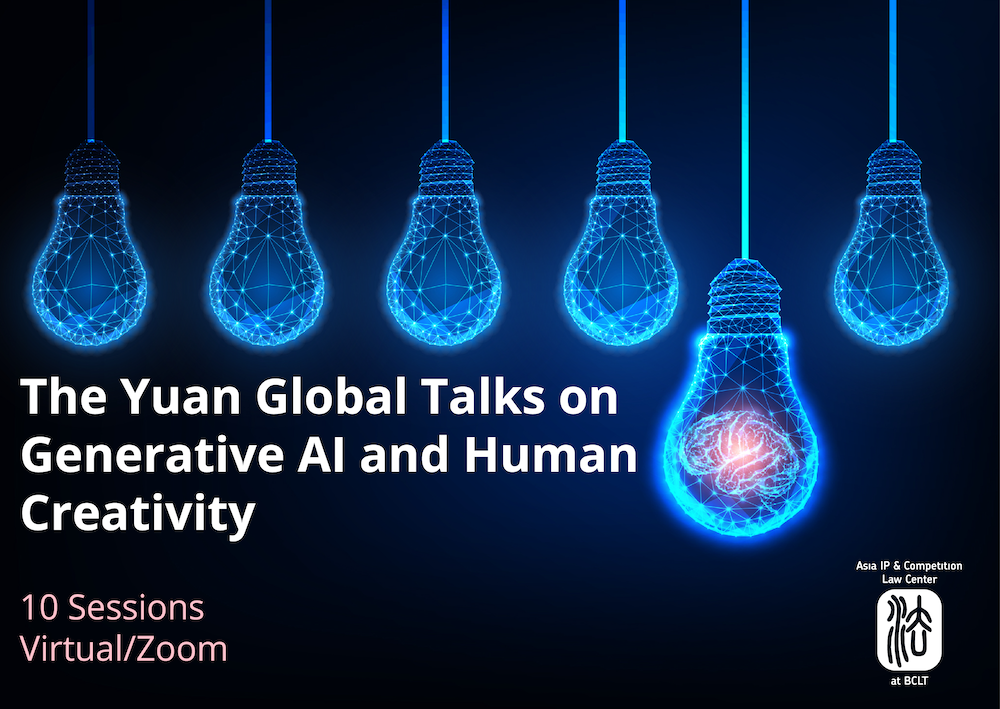
- This event has passed.
Yuan Global Talks on Generative AI and Human Creativity: (Talk III) How Fair is Fair Use in the “AI Age”?
April 30 @ 5:00 pm - 6:30 pm

Talk III: How Fair is Fair Use in the “AI Age”?
April 30, 2024 @ 5:00-6:30 p.m. PT
General MCLE Credit Available
Conventionally, the fair use doctrine has been serving as a safety valve in balancing the copyright protection of expressive creativity and necessary access for cumulative creativity. Despite the modern US Copyright Act’s legislative intent of having broad exclusive rights and narrow limitations however, for some reasons in past decades the supposedly limited fair use doctrine has turned essentially into a broad transformativeness test, i.e. the secondary work is transformative as a matter of law “[i]f looking at the works side-by-side, the secondary work has a different character, a new expression, and employs new aesthetics with [distinct] creative and communicative results.” This simplistic inquiry has arguably caused, among other confusions, a serious collision between authors’ right to derivative works and the transformative-use dominated fair use defense. This collision is likely to be further exacerbated with the rapid deployment of generative AI tools in the creative industry, where consumption of large amount of copyrighted works (as “raw materials”) in the training process has been forcefully argued by some as fair use, due to the “transformativeness” of the AI outputs. But is this “fair use” indeed fair, particularly in light of the fact that many such AI outputs constitute competitive commodities with the original copyrighted works created by human artists? On a deeper level, is such a broad fair use doctrine consistent with the principles of the IP system that has been running for centuries to incentivize and honor human creativity? In the wake of Warhol v. Goldsmith, a landmark case in which the US Supreme Court took great pains to clarify the decade-long confusion prevalent in the interplay of fair use and author’s right to derivative works, please join me in an in-depth discussion with my esteemed Berkeley colleagues Prof. Peter Menell, Prof. Robert Merges: how fair is “fair use” in the AI age?
Discussants:
Dr. Yuan Hao, BCLT
Prof. Peter Menell, BCLT
Prof. Robert Merges, BCLT
Series Description
After decades of bust and boom, the year 2023 witnessed a meteoric rise of Generative AI (“Gen-AI”). Distinct from its predecessor Analytical AI, Gen-AI’s capability to produce ostensibly creative content, including aesthetically appealing “art” pieces with human prompts and innovative technical solutions to well-defined problems, heralds a paradigm shift in human being’s creative process. As manifested by the recent cases globally, this paradigm shift starts to pose real-world challenges to the good old IP system that aims to incentivize and honor human creativity. Among the various doctrinal challenges, two stand out at the moment as particularly pressing: (1) should IP protect the outputs of such human + AI (“Centaur”) creative synergies, and (2) can proprietary data be “fair used” to train Gen-AI? In the long term, how IP system addresses these challenges may have profound implications on the evolution of the Gen-AI ecosystem, and more importantly, the future of human creativity. Finding the proper answers however, requires a perspective that spans beyond the confines of IP doctrines alone – it demands solid understanding of the rapidly evolving value chain and commercialization landscape, core regulatory principles in harmony with a human-centered approach, the concrete mechanisms IP system uses to facilitate diversity and equity in creation, as well as a philosophical contemplation on what human creativity means in the dawning “age of Gen-AI”.
Against this backdrop, Berkeley Asia IP and Competition Law Center (“BAIC”) at BCLT launches the “Yuan Global Talks on Generative AI and Human Creativity.” The series is named for the Chinese “Yuan” (元), echoing the beginning of a new epoch, and “Yuan” (圆), a circle symbolizing inclusivity, equality and productive discourse – principles that happen to resonate with the hostess’ name, Dr. Yuan Hao, Senior Fellow and Co-Director of BAIC, who co-taught a brand new course titled “IP and Human Creativity in the ‘AI Age’” in the autumn of 2023. This conversation series strides beyond national borders, aiming to foster a constructive exchange between voices from diverse spheres. It is an invitation to scholars, creators, entrepreneurs and policy makers, particularly from the US and Asia, to forge a collaborated path through the evolving narrative of Gen-AI assisting, rather than displacing human creativity.